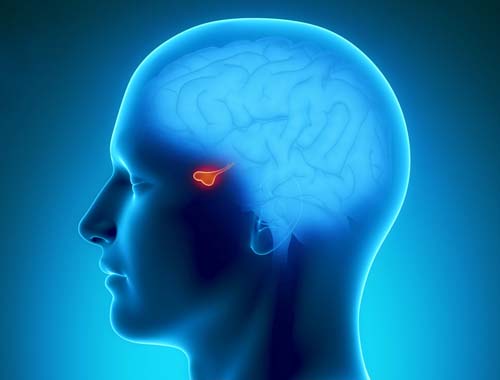Hypopituitarism
Hypopituitarism is a rare disorder in which the pituitary gland either fails to produce one or more of its hormones or does not produce enough of them. This is a condition in which the pituitary gland does not produce normal amounts of some or all of its hormones. The pituitary is a small bean-shaped gland situated at the base of brain, behind nose and between ears. Despite its size, this gland secretes hormones that influence nearly every part of body. In hypopituitarism, body has a short supply of one or more of these pituitary hormones. This deficiency can affect any number of body's routine functions, such as growth, blood pressure and reproduction. Persone will need medications for the rest of life to treat hypopituitarism, but the symptoms can be controlled. The pituitary gland is a small structure that is located just below the brain. It is attached by a stalk to the hypothalamus, the area of the brain that controls its function. The hormones released by the pituitary gland (and their functions) are: Adrenocorticotropic hormone (ACTH) -- stimulates the adrenal gland to release cortisol; cortisol helps to maintain blood pressure and blood sugar; Antidiuretic hormone (ADH) -- controls water loss by the kidneys; Follicle stimulating hormone (FSH) -- controls sexual function and fertility in males and females; Growth hormone (GH) -- stimulates growth of tissues and bone; Luteinizing hormone (LH) -- controls sexual function and fertility in males and females; Oxytocin -- stimulates the uterus to contract during labor and the breasts to release milk; Prolactin -- stimulates female breast development and milk production; Thyroid stimulating hormone (TSH) stimulates the thyroid gland to release hormones that affect the body's metabolism. In hypopituitarism, there is a lack of one or more pituitary hormones. Lack of the hormone leads to loss of function in the gland or organ that it controls. For example, no TSH leads to loss of function in the thyroid gland. Hypopituitarism may be caused by: Brain surgery; Brain tumor; Head trauma; Infections of the brain and the tissues that support the brain; Radiation; Stroke; Subarachnoid hemorrhage (from a burst aneurysm); Tumors of the pituitary gland or hypothalamus; Occasionally, hypopituitarism is due to uncommon immune system or metabolic diseases, such as: Hemochromatosis; Histiocytosis X; Lymphocytic hypophysitis; Sarcoidosis; Hypopituitarism is also a rare complication after pregnancy, a condition called Sheehan's syndrome. Symptoms: Abdominal pain; Decreased appetite; Decreased sexual interest (in men); Failure to release milk (in women); Fatigue; Headache; Infertility (in women); Lack of sex drive (in women); Loss of armpit or pubic hair; Loss of body or facial hair (in men); Low blood pressure; Sensitivity to cold; Short height (less than 5 feet) if onset is during a growth period; Slowed growth and sexual development (in children); Stopping of menstrual periods (in women); Vision problems; Weakness; Weight loss; Symptoms may develop slowly and may vary greatly, depending upon: The number of hormones that are missing and the organs they affect; The severity of the disorder; Other symptoms that may occur with this disease: Face swelling; Hair loss; Hoarseness or changing voice; Joint stiffness; Weight gain (unintentional)
